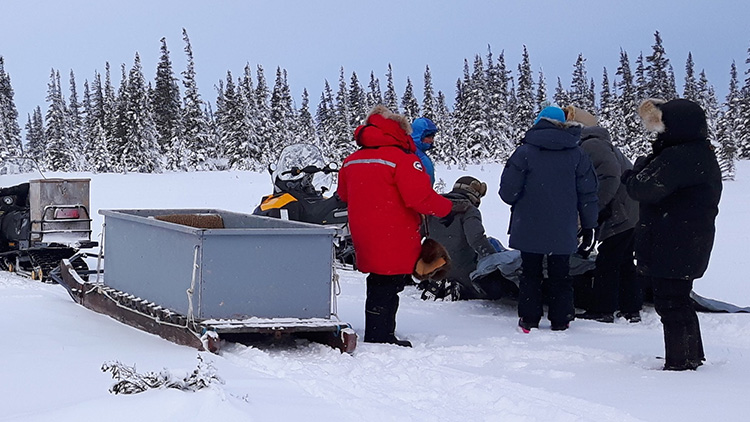Environmental partners

Earthwatch team preparing for field work, Churchill, Manitoba, Canada.
Shell has environmental partnerships with the International Union for Conservation of Nature (IUCN), Wetlands International, The Nature Conservancy and Earthwatch. Our environmental partners can bring specific expertise to our projects in areas such as biodiversity, while at the same time advancing their own scientific or conservation knowledge by working on our projects.
Managing environmental impact
We have worked with IUCN since 1999. As part of our collaboration, IUCN has set up two independent scientific panels to help us mitigate environmental impacts.
At the end of 2016, the Niger Delta Panel concluded its work with Shell Petroleum and Development Company Limited of Nigeria (SPDC), the operator of the SPDC Joint Venture. The work focused on restoring biodiversity at sites affected by oil spills and on enhanced remediation techniques within the SPDC JV areas of operation in the Niger Delta. IUCN and SPDC will continue to work together to improve the recovery of biodiversity at sites within SPDC JV’s areas of operation.
In Russia, the Western Gray Whale Advisory Panel has been advising Sakhalin Energy (Shell interest 27.5% minus one share) since 2004. A report issued at the 2016 IUCN World Conservation Congress stated that over the last 12 years Sakhalin Energy has made important efforts to limit the impact of its operations on whales and their fragile environment. During this period, the western gray whale population has grown between 3% and 4% annually, from an estimated 115 animals in 2004 to 174 in 2015.
Supporting biodiversity and livelihoods
Shell has worked with Wetlands International for nine years. Since 2010, we have sponsored a Wetlands International project to help three communities in the Niger Delta - the Abobiri, Obia-yagha and Opume - change the way they manage their wetland environment. To stop the unsustainable use of wetlands, such as mangrove cutting, community members were given access to micro-credits, to adopt more sustainable livelihoods, like fish and snail farming. One of the conditions for getting access to the micro-credits was participation in wetland restoration activities, such as planting wetland trees and clearing overgrown waterways.
In the Majnoon oil field in southern Iraq, Shell is working with Wetlands International, IUCN and others to ensure that oil and gas development does not cause harm to the Mesopotamian Marshes and to contribute to their restoration. Parts of the marshes that lie outside of the Majnoon field were designated a UNESCO World Heritage Site in 2016.
In 2016, Shell Development Oman supported a Wetlands International's survey of birds at Barr Al Hikman wetlands, a globally significant wetland for water birds.
Biodiversity and rehabilitating coastlines
Shell and The Nature Conservancy are working together to help protect the environment and to build knowledge about conservation in industry and government.
A previous joint project in the Louisiana coastal zone, USA, focused on developing a nature-based approach to control pipeline erosion. In 2016, Shell constructed a pilot living shoreline in the area by bringing in soil and rock and planting native vegetation. Within nine months, the constructed shoreline appeared more stable, and vegetation is reclaiming the area, helping to protect the pipeline and coastal area. We will continue to monitor the site to assess its long-term performance.
Engaging employees
Shell employees from 49 countries have contributed nearly 44,000 hours to environmental research and conservation projects since the start of our employee volunteer partnership with Earthwatch, Project Better World, 19 years ago.
Earthwatch expeditions enable Shell employees to deepen their understanding of environmental issues and make a contribution to scientific research. The Enhanced Learning Programme allows Shell participants to hone their sustainability leadership skills and create sustainability action plans to implement at work or at home. In 2016, Shell employees from 21 countries took part in these programmes.
On the Earth Skills Network programme, employees share their knowledge and expertise by mentoring managers of protected areas. This gives participants the opportunity to sharpen their professional skills and further their understanding of how business decisions can impact the environment. Shell has supported 45 protected areas since 2009, including six in 2016.
Also in partnership with Earthwatch, FreshWater Watch is a global research project that aims to safeguard the quality and supply of fresh water for the future.
